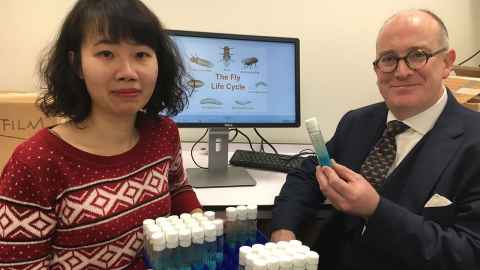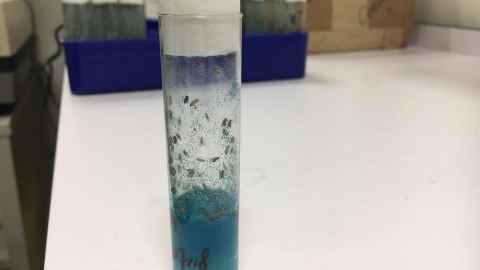Tiny fruit flies unravelling the secrets to end of life
10 August 2018
We are used to seeing them dive-bombing our glass of wine or hovering around the fruit bowl, but now the tiny fruit fly is paving the way in ground-breaking research at the University of Auckland.

PhD candidate Jia Zhao of the University of Auckland is using the miniscule flies, or Drosophila melanogaster, into research on the circadian clock.
Her work, under the supervision of Dr James Cheeseman and Associate Professor Guy Warman, in the Department of Anaesthesiology, has discovered a molecular marker linked to the biological clock which accurately predicts the animal’s death several days before it dies.
Their paper, Clock gene expression and locomotor activity predict death in the last days of life in Drosophila melanogaster, has just been published in Scientific Reports.
We are interested in the circadian clock which you and I and every animal has. It controls everything from behaviour to physiology. The primary implication in this study is that death, at least in flies, can be reliably predicted in clock gene expression.
In the study they investigated how the molecular clock in the brain and in the peripheral tissues changes with increasing age and before death. They examined whether strong entrainment cues improve age-related functional decline of the circadian clock. They were able to measure real-time expression of clock genes products PERIOD and TIMELESS in the Drosophila in three ages, (10, 30- and 50-days-old) for an extended period of time.
The circadian clock generates the daily rhythms in most organisms. This clock is affected by time and diminishes with advancing age.
“We are interested in the circadian clock which you and I and every animal has,” Dr Cheeseman says.
“It controls everything from behaviour to physiology. The primary implication in this study is that death, at least in flies, can be reliably predicted in clock gene expression.”
“We used the flies as a model because we can monitor the circadian clock rhythms in the living flies right down to cycling of individual clock genes.”
Jia says the study looked specifically at two circadian clock genes, PERIOD and TIMELESS (which have similar counterparts in humans) and how they change in the days immediately preceding death and the clock stops cycling. The significance of the finding is the linking of the breakdown in the circadian clock with death.

The fruit fly was chosen for the study as it has a short life cycle and shares a similar circadian clock to humans. While breakdown of the clock in behaviour has been observed before, no-one has tested clock gene expression.
“We can tell when the fruit fly is going to die by studying markers in the TIMELESS gene. When that gene starts to increase and loses rhythmicity in the fruit fly you know that particular fly is going to die in four days.
“We hypothesise that it’s the break down in communication between the peripheral clock cells which causes this,” she says.
“The flies don’t have to be old to show this pattern, it’s a marker in young flies as well as old. If there is a loss of this pattern in the PERIOD and TIMELESS genes then they die as well.”
The team sourced thousands of fruit flies and kept them in regular light/dark cycles with constant temperature or with temperature cycles to test the influence of entrainment. The health of the insects was monitored daily and they were transferred into a plate reader to monitor the bioluminescence (glowing) signal of the genes every hour for at least 10 days.
This fly provides a model for the aging of clocks more generally and has implications for other animals and humans.
Media queries
Anna Kellett | Media adviser
Tel: 09 923 9336
Mob: 027 838 9202
Email: anna.kellett@auckland.ac.nz